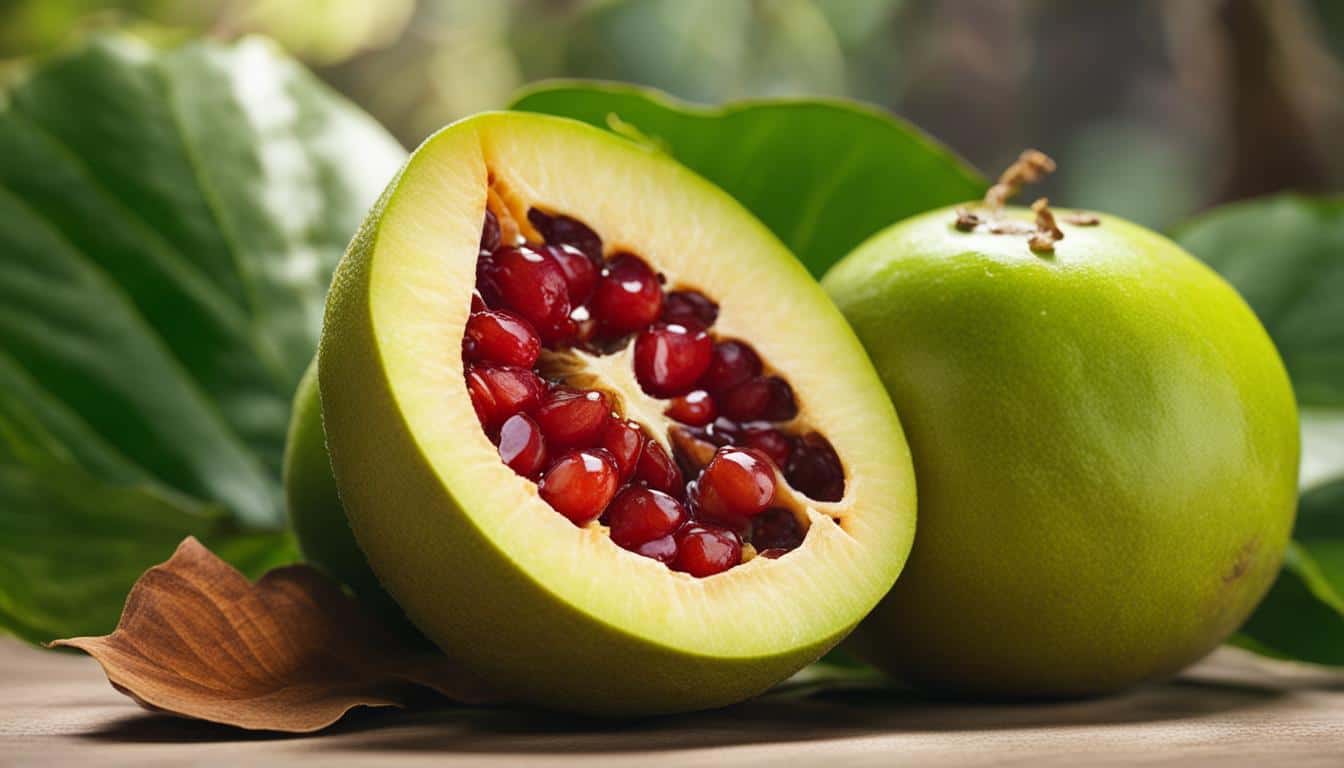When it comes to sweetening our favorite foods and beverages, many of us are looking for healthier alternatives to refined table sugar. Excessive sugar consumption has been linked to negative health effects and chronic diseases like obesity, heart disease, and diabetes. That’s why I decided to explore two popular natural sweeteners, monk fruit and agave, to find a healthier and more wholesome option.
Key Takeaways
- Monk fruit and agave are natural sweeteners that can be used as substitutes for refined sugar.
- Monk fruit is a zero-calorie sweetener with antioxidant properties.
- Agave syrup is derived from the agave plant and should be used in moderation due to its fructose content.
- Both sweeteners offer health benefits, but the choice ultimately depends on individual preferences and dietary needs.
- Reducing overall sugar consumption is important for maintaining a healthy lifestyle.
Understanding Sugar Substitutes
When it comes to sweetening our favorite foods and beverages, there are plenty of options available. Sugar substitutes have gained popularity as people look for alternatives to refined sugar. In this section, we will explore different types of sugar substitutes and their characteristics.
Artificial Sweeteners
Artificial sweeteners like Splenda, NutraSweet, and Sweet’N Low are synthetic sugar substitutes commonly used in diet sodas, desserts, and other low-calorie products. While they provide sweetness without adding calories, some studies have raised concerns about their potential negative health effects. It’s important to use them in moderation and be mindful of their impact on your overall health.
Sugar Alcohols
Sugar alcohols such as xylitol and erythritol are lower in calories and sweetness compared to table sugar. They are commonly found in sugar-free candies, chewing gums, and other diabetic-friendly products. However, consuming large quantities of sugar alcohols may cause gastrointestinal issues like bloating and diarrhea. It’s important to consider your tolerance and consume them in moderation.
Novel Sweeteners
Novel sweeteners like stevia and monk fruit have gained popularity as natural sugar substitutes. Stevia is derived from the leaves of the Stevia rebaudiana plant, and monk fruit is extracted from the fruit of Siraitia grosvenorii. Both sweeteners are plant-based, contain zero calories or carbohydrates, and are much sweeter than table sugar. They offer a viable option for those looking to reduce calorie intake while still enjoying sweetness in their food and drinks.
Natural Sugar Sweeteners
Natural sugar sweeteners such as honey and agave nectar are derived from natural sources. While they may seem healthier compared to refined sugar, it’s important to remember that they still contain high amounts of sugar and should be consumed in moderation. These sweeteners can be used as an alternative to table sugar in various recipes, but it’s crucial to be mindful of their calorie content.
Now that we have a better understanding of different sugar substitutes, let’s delve deeper into the unique qualities and potential benefits of monk fruit and agave in the next sections.
Monk Fruit: A Sweet Antioxidant
Monk fruit, also known as Lo Han Guo, is a plant-based sweetener that is significantly sweeter than table sugar. It offers a deliciously sweet taste without the calories or carbohydrates, making it a popular choice for those seeking a healthier alternative. Not only does monk fruit provide a satisfying sweetness, but it also comes with unique health benefits and antioxidant properties.
Unlike traditional sugar, monk fruit contains zero calories and doesn’t cause spikes in blood sugar levels, making it a suitable option for individuals with diabetes or those looking to manage their carbohydrate intake. This natural sweetener can be enjoyed guilt-free, knowing that it won’t interfere with your dietary goals or overall wellness.
Aside from its sweetness, monk fruit is known for its impressive antioxidant properties. Antioxidants help protect our cells from damage caused by free radicals, which are unstable molecules that can contribute to chronic diseases and premature aging. By incorporating monk fruit into your diet, you can enjoy a flavorful sweetener while also giving your body an extra dose of antioxidant support.
With its versatility and sweetening power, monk fruit can be used as a sugar substitute in a wide range of recipes. From baked goods like cookies and cakes to beverages like smoothies and teas, monk fruit adds a delightful sweetness without the added calories. Whether you’re following a specific diet or simply looking for a healthier option, incorporating monk fruit sweetener into your favorite recipes can elevate their taste and satisfy your cravings.
Benefits of Monk Fruit:
- Zero-calorie alternative: Enjoy sweetness without worrying about added calories or carbohydrates.
- Diabetes-friendly: Monk fruit doesn’t raise blood sugar levels, making it suitable for individuals with diabetes or those managing their carbohydrate intake.
- Antioxidant support: The natural antioxidants in monk fruit help protect against cell damage caused by free radicals.
- Versatile usage: Use monk fruit sweetener in a variety of recipes, including baked goods, beverages, and more.
“Monk fruit is a sweet sensation that can enhance the flavor of your favorite recipes while offering unique health benefits.”
| Monk Fruit Sweetener | Table Sugar |
|---|---|
| Zero calories | Empty calories |
| No spike in blood sugar levels | Raises blood sugar levels |
| Antioxidant properties | No antioxidants |
| Suitable for various diets | Not suitable for some dietary restrictions |
Incorporating monk fruit sweetener into your everyday cooking and baking can be a simple and delicious way to make healthier choices. Whether you’re following a specific diet or simply looking to reduce your sugar intake, monk fruit offers a natural and flavorful alternative. Experiment with monk fruit recipes and enjoy the benefits of this sweet antioxidant.
Agave: A Natural Sweetener with Caution
When it comes to natural sweeteners, one option that often comes to mind is agave. Derived from the agave plant, agave syrup is commonly marketed as a healthier alternative to table sugar due to its natural origin. However, it’s important to approach agave with caution and be mindful of its potential impact on our health.
Agave syrup, although derived from a natural source, undergoes a highly processed extraction process. This process often involves heating and filtering, which can strip away some of its natural nutrients and result in a high concentration of fructose.
The high fructose content in agave syrup has raised concerns among health experts. Studies suggest that excessive fructose consumption may contribute to health issues such as obesity, fatty liver disease, and insulin resistance.
While agave syrup does have some potential health benefits, such as a lower glycemic index compared to table sugar, the risks associated with its fructose content should not be overlooked. It is recommended to use agave nectar in moderation and be mindful of its fructose intake, especially for individuals with existing health conditions such as diabetes or metabolic syndrome.
When choosing a sweetener, it’s important to consider the overall balance of your diet, individual health needs, and preferences. There are other natural sweeteners available, such as monk fruit sweetener, that offer alternative options with potentially lower fructose content.

The Potential Benefits of Agave
It’s worth noting that agave syrup does have some redeeming qualities. It is naturally derived and does not contain any artificial additives or preservatives. Agave syrup also has a sweet, mild flavor that can be a delicious addition to various recipes.
Agave syrup is commonly used as a vegan alternative to honey in cooking and baking. Its liquid form and sweet taste make it a versatile ingredient that can be incorporated into dressings, sauces, and beverages. However, it’s important to remember that moderation is key when using agave as a sweetener.
The Comparison: Monk Fruit vs Agave
When comparing monk fruit and agave, it’s important to consider factors such as sweetness, health benefits, and potential drawbacks.
Monk fruit is significantly sweeter than agave and contains zero calories or carbohydrates. It also has antioxidant properties.
Agave, on the other hand, is a natural sweetener but can contain high fructose levels and should be used in moderation.
Both sweeteners can be used as substitutes for table sugar, but it’s important to consider individual preferences and dietary needs.

Using Monk Fruit and Agave in Recipes
When it comes to finding healthier alternatives to table sugar, monk fruit and agave are two natural sweeteners that offer great options. Incorporating these sweeteners into your recipes can add a touch of sweetness without the negative health effects associated with excessive sugar consumption.
Let’s explore the ways you can use monk fruit and agave in your favorite dishes and beverages:
Monk Fruit Sweetener:
If you’re looking for a zero-calorie, zero-carbohydrate sweetener, monk fruit is a great choice. It is significantly sweeter than table sugar, so a little goes a long way. Here are some ways you can use monk fruit sweetener in your recipes:
- Baking: Add monk fruit sweetener to your favorite cookie, cake, or muffin recipes for a guilt-free indulgence.
- Beverages: Sweeten your hot or cold beverages like tea, coffee, or smoothies with monk fruit sweetener for a naturally sweet taste.
- Other sweet treats: Sprinkle monk fruit sweetener on top of fresh fruits or yogurt for a delicious and healthy dessert.
Agave Syrup:
Agave syrup is a natural liquid sweetener derived from the agave plant. While it should be used in moderation due to its fructose content, it can still be a good alternative to processed sugars. Here are some ways you can incorporate agave syrup into your recipes:
- Pancakes and waffles: Substitute agave syrup for maple syrup or honey when making pancakes or waffles for a lighter and more natural sweetener.
- Smoothies: Add a drizzle of agave syrup to your favorite smoothie recipe to enhance the flavor and create a balanced sweetness.
- Salad dressings: Use agave syrup as a natural sweetener in homemade salad dressings to add a touch of sweetness to your salads.
Remember, when using monk fruit and agave in your recipes, it’s essential to experiment with different quantities to find the right balance of sweetness for your taste buds. Enjoy the benefits of these natural sweeteners while exploring new culinary possibilities in your kitchen!

The Best Sweetener for You
The choice between monk fruit and agave ultimately depends on individual preferences and dietary needs. Monk fruit is a zero-calorie sweetener with antioxidant properties, while agave is a natural sweetener with caution due to its fructose content.
When deciding on the best sweetener for your needs, it’s important to consider the following factors:
- Taste: Monk fruit is significantly sweeter than agave, so if you prefer a sweeter flavor, monk fruit might be the better choice.
- Caloric and Carbohydrate Content: If you’re looking for a sweetener with zero calories and carbohydrates, monk fruit is the clear winner. However, if you’re watching your sugar intake, it’s important to note that both sweeteners should be used in moderation.
- Health Benefits: Monk fruit offers antioxidant properties, which can be beneficial for overall health. Agave, on the other hand, provides a natural alternative to refined sugar but should still be consumed mindfully due to its potential fructose content.
- Recipes: Consider the types of recipes you frequently make. Monk fruit can be used as a substitute for sugar in various baked goods and beverages, while agave syrup works well as a liquid sweetener in recipes like pancakes, smoothies, and salad dressings.
Ultimately, the best sweetener for you depends on your individual needs and preferences. It’s always a good idea to consult with a healthcare professional or nutritionist to ensure you’re making a well-informed decision. Remember, using natural sweeteners in moderation is key to maintaining a balanced and healthy diet.
Tips for Reducing Sugar Consumption
Regardless of the sweetener chosen, reducing overall sugar consumption is important for maintaining a healthy lifestyle. Here are some tips for reducing sugar intake:
- Avoid processed foods: Processed foods often contain high amounts of added sugars. Opt for whole, unprocessed foods instead, which are naturally lower in sugar.
- Choose whole food sources of sweetness: Instead of reaching for sugary snacks or desserts, satisfy your sweet tooth with fruits, which are packed with natural sugars and essential nutrients.
- Practice moderation when using sweeteners: While natural sweeteners like monk fruit and agave can be a healthier alternative, it’s still important to use them in moderation. Be mindful of the amount of sweeteners you add to your foods and beverages.
- Read labels: Pay close attention to food labels and ingredient lists. Look out for hidden sources of added sugars in packaged products, including ingredients like high fructose corn syrup, cane sugar, and sucrose.
Remember, reducing sugar consumption is a gradual process. Making small changes to your diet can have a significant impact on your overall health.
By following these tips, you can reduce your sugar intake and make healthier choices for your well-being.
The Benefits of Reducing Sugar Consumption
Reducing sugar consumption offers numerous health benefits, including:
- Improved weight management: Excessive sugar consumption is closely linked to weight gain and obesity. By reducing sugar intake, you can better manage your weight and promote a healthier body composition.
- Reduced risk of chronic diseases: High sugar intake has been associated with an increased risk of chronic diseases such as diabetes, heart disease, and certain types of cancer. Cutting back on sugar can help lower these risks.
- Stable energy levels: Consuming too much sugar can lead to energy crashes and fatigue. By reducing sugar consumption, you can maintain stable energy levels throughout the day.
- Better dental health: Sugar is a leading cause of tooth decay. Limiting sugar intake can help protect your teeth and maintain good oral health.
By reducing sugar consumption and making healthier dietary choices, you can improve your overall well-being and reduce the risk of negative health effects associated with excessive sugar intake.
| Benefits of Reducing Sugar Consumption | |
|---|---|
| Improved weight management | Excessive sugar consumption is closely linked to weight gain and obesity. By reducing sugar intake, you can better manage your weight and promote a healthier body composition. |
| Reduced risk of chronic diseases | High sugar intake has been associated with an increased risk of chronic diseases such as diabetes, heart disease, and certain types of cancer. Cutting back on sugar can help lower these risks. |
| Stable energy levels | Consuming too much sugar can lead to energy crashes and fatigue. By reducing sugar consumption, you can maintain stable energy levels throughout the day. |
| Better dental health | Sugar is a leading cause of tooth decay. Limiting sugar intake can help protect your teeth and maintain good oral health. |
Reducing sugar consumption has numerous benefits, including improved weight management, reduced risk of chronic diseases, stable energy levels, and better dental health.
Conclusion
In conclusion, when it comes to choosing a healthier sweetener alternative, both monk fruit and agave offer viable options. Monk fruit is a zero-calorie sweetener with the added benefit of antioxidant properties. On the other hand, agave is a natural sweetener derived from the agave plant. However, due to its fructose content, agave should be used in moderation.
When making the switch to a healthier sweetener, it’s important to consider individual preferences and dietary needs. Some people may prefer the intense sweetness of monk fruit, while others may opt for the natural appeal of agave. Experimentation with both sweeteners in various recipes can help determine which one suits your taste and requirements best.
As with any dietary change, it’s always a good idea to consult with a healthcare professional or nutritionist before making significant shifts in your sweetener consumption. They can provide personalized advice and recommendations based on your specific health needs and goals. Ultimately, finding a suitable sweetener swap can contribute to a better lifestyle and improve overall well-being.
FAQ
What are the health benefits of monk fruit and agave?
Monk fruit is known for its antioxidant properties and contains zero calories or carbohydrates. Agave is a natural sweetener but should be used in moderation due to its fructose content.
How can monk fruit and agave be used as substitutes for table sugar?
Monk fruit sweetener can be used in baking, beverages, and other sweet treats. Agave syrup can be used as a liquid sweetener in recipes like pancakes, smoothies, and salad dressings.
What should I consider when choosing between monk fruit and agave?
Factors to consider include sweetness, health benefits, and potential drawbacks. Monk fruit is significantly sweeter than agave and contains zero calories or carbohydrates, while agave should be used in moderation due to its fructose content.
Are there any tips for reducing overall sugar consumption?
Yes, tips include avoiding processed foods, choosing whole food sources of sweetness, and practicing moderation when using sweeteners. It’s also important to read labels and be aware of hidden sources of added sugars in packaged products.
Why is reducing sugar consumption important for a healthy lifestyle?
Excessive sugar consumption is linked to negative health effects and chronic diseases. Choosing healthier sweetener alternatives can contribute to a better lifestyle.





Leave a Reply